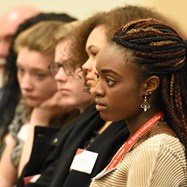2014-15 access agreements
11 July 2013
Commenting on the 2014-15 access agreements published today by the Office for Fair Access (OFFA), Dr Wendy Piatt, Director General of the Russell Group of Universities, said:
“Russell Group universities are keen to ensure that anyone with the qualifications, potential and determination to succeed has the opportunity to study at a leading university, irrespective of their background, and today’s publication of access agreements (in England) demonstrates the strength of their commitment.
“Over the next few years Russell Group universities will be pumping millions more into their outreach programmes and financial support expanding on their existing hard work in this area. In 2014-15 the 20 Russell Group universities in England will be spending £193.3 million on scholarships, fee waivers and bursaries aimed at the most disadvantaged, and £36.2 million on outreach activities, including working with teachers and pupils in schools and putting on summer schools and access schemes.
“A total of £216.3 million from additional fee income will be spent through their access agreements in 2014-15.
“Next year Russell Group universities in England will be spending an average of 33.2% of their additional fee income on widening participation measures - more than the 27.5% average across all higher education institutions. And once financial support is taken into account the estimated average cost of fees per student is less than £8,400 at all our universities and less than £8,000 at a quarter of them. In addition students at many of our universities benefit from bursaries and other support for undergraduates funded through philanthropic donations, not included in today's figures.
“However, it is important not to lose sight of the bigger picture – increased regulation of universities will not tackle the real issues. Russell Group universities put a lot of effort into trying to help solve problems around access to higher education but we cannot do so alone; progress continues to be limited by levels of achievement at school and a lack of advice on A-level subject choices.
“There are real challenges with setting and achieving specific outcome targets for each university. Our universities’ outreach work often inspires students with little or no family history of higher education to study for a degree at institutions other than those in the Russell Group. If only a university’s own student intake is measured as an output of this work they could be put off supporting the most disadvantaged students. Financial penalties for not meeting these targets would not only be unfair but they would also reduce the money available for programmes to help poorer students study at our universities.
“Finally, it is important to re-emphasise that admission to university should continue to be based on merit and fairness, with high academic standards maintained.”
Notes to Editors
- There are 20 Russell Group universities in England: University of Birmingham; University of Bristol; University of Cambridge; Durham University; University of Exeter; Imperial College London; King's College London; University of Leeds; University of Liverpool; London School of Economics & Political Science; University of Manchester; Newcastle University; University of Nottingham; University of Oxford; Queen Mary, University of London; University of Sheffield; University of Southampton; University College London; University of Warwick; and University of York.
- The figure of £193.3 million for spending on bursaries, scholarships and fee waivers relates to the combined access agreement expenditure and Government National Scholarship Programme allocation.
- Additional fee income refers to all fee income above the £6,000 per student basic fee for Home/European Union undergraduates.
- Financial support includes fee waivers, bursaries, scholarships and other in-kind support offered under access agreements and the National Scholarship Programme. It does not include the wide range of access initiatives undertaken in our universities that are funded from other sources, including donation and endowment income.
-
Hamir Patel
hamir.patel@russellgroup.ac.uk
020 3816 1316
-
Hollie Chandler
Hollie.Chandler@russellgroup.ac.uk
020 3816 1307
 X
X


